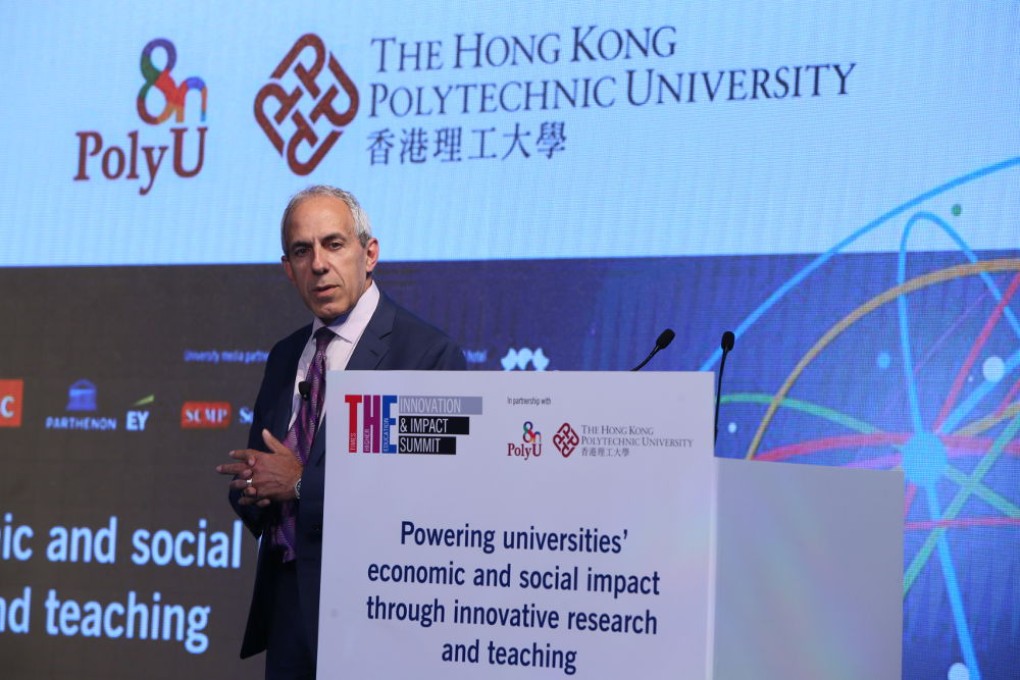Making an Impact
[Sponsored article] The US is using an antiquated system of research that wastes time and resources, and results in fewer impactful cancer treatments, says cancer expert Greg Simon. To maximise innovation, changes should be made at university level, said Simon, director of the Biden Cancer Initiative at the Biden Foundation, at the Times Higher Education Innovation and Impact Summit, which took place from May 31 to June 2 organised by The Hong Kong Polytechnic University (PolyU) and Times Higher Education.

[Sponsored article]
The US is using an antiquated system of research that wastes time and resources, and results in fewer impactful cancer treatments, says cancer expert Greg Simon. To maximise innovation, changes should be made at university level, said Simon, director of the Biden Cancer Initiative at the Biden Foundation, at the Times Higher Education Innovation and Impact Summit, which took place from May 31 to June 2 organised by The Hong Kong Polytechnic University (PolyU) and Times Higher Education.
“Everything has changed, including the way we communicate, shop, travel, bank, take a photo, and find directions,” Simon said. “But we still conduct research the way we did at the end of the Second World War. Everything has to change in the way the universities operate.”
Simon is the former executive director of the White House Cancer Moonshot Task Force. He was appointed by the Obama administration in March 2016, and worked with former vice president Joe Biden to try and double the impact of cancer research. Simon worked with the Task Force, academia, and the private sector, to forge new collaborations to develop innovations. The idea was to use the research to enable practical steps forward: “If you don’t start, innovation is just an idea,” he said.
The “War on Cancer” began in 1971, when President Nixon signed the National Cancer Act into law in the US. Since then, the goal has been to use research to bring about impactful health outcomes, rather than simply publish. This is known as “translational research”. The tenure system, with its emphasis on publication, means that universities are lagging behind in this, said Simon. “The path to tenure is the problem,” he says. “It is far too heavy on publication and too light on impact.” As a result, innovation often happens outside of universities, in small biotech companies that “take the ideas which have reached their limit inside the university environment,” Simon said.

Universities are averse to risk, and this can affect innovation, as risk means that the outcome is unpredictable, Simon notes. The tenure system reinforces this, as publication, rather than positive impact, is often the goal, he said. “Most universities would not change their tenure system and publication practices. They would not ask for grants for risky research,” Simon said.
Another problem is that research cannot be replicated almost 50 per cent of the time, because of the bias of the university researchers, Simon said. According to Simon, millions of dollars are being wasted by building on works which have not been replicated, and are therefore not credible.
The White House Cancer Moonshot Task Force consisted of 20 government departments, including NASA. During its first meeting, Simon asked participants to evaluate how they could touch patients in their cancer journey from prevention to detection, diagnosis, treatment and survivorship, and to work out what impact they could have. Then he asked them to think about how to double this impact in six months, and rethink their mission.
On examination, the participants were astounded by the resources, research experience, and data they already had, Simon says. They also realised they could achieve more by working together. The researchers took stock of the assets of each team, and sought to innovate by arranging them in new ways. The important thing, said Simon, was to act. Although knowledge is never complete in cancer research, it’s important to act on it nonetheless.
More emphasis and funding needs to be applied to translational research, Simon said. “We have been focusing on basic science for a long time. Translational science funding is way too small to really harvest the benefits of basic science. We need to be taking chances. The patients want us to take chances,” said Simon.